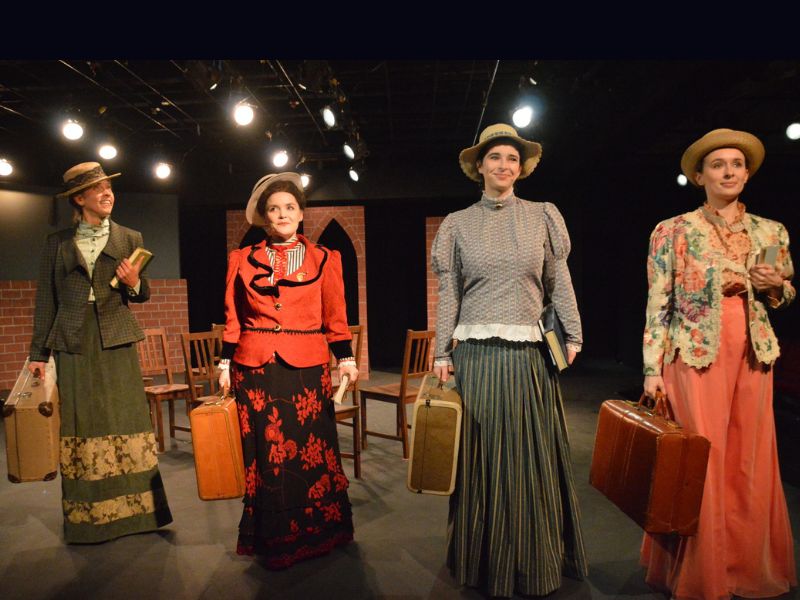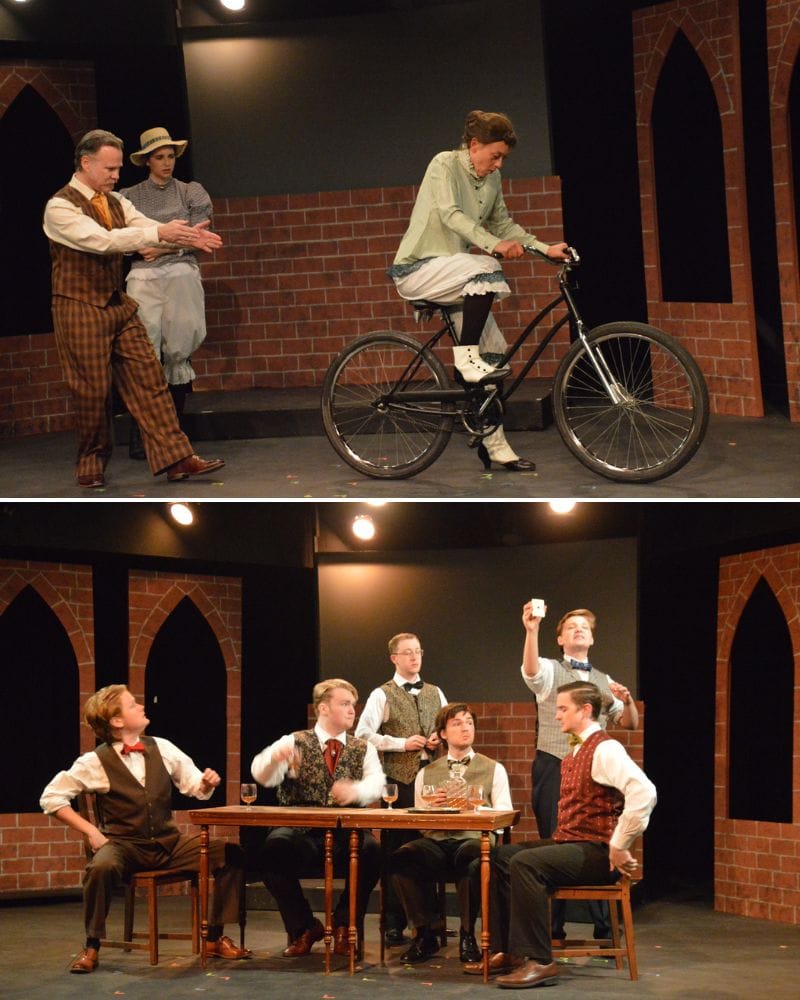In any quest for social justice, it can be useful to look back at how bad things were, to see how far we’ve come. This seems to be the impetus behind Jessica Swale’s play Blue Stockings, about a pivotal moment in the quest for students at Girton, the first women’s college at Cambridge University, to win the right to graduate and be awarded degrees, as men had been doing for almost 900 years.
The show opens in 1896 with Dr. Henry Maudsley (Ian Smith De Waal), a pompous psychiatrist, pontificating on the dangers of education to the female reproductive system, which all reasonable people know to be the only valuable part of women — while simultaneously Mrs. Elizabeth Welsh, the Head of Girton College, welcomes the new class of women. Maudsley, as much as he sounds like a parody of patriarchal windbaggery, was a real professor, and Mrs. Welsh was a real classicist and the second longest-serving Mistress of the college. But the students are all fictional characters: Tess, the curious one; Carolyn, the bohemian; Celia, the hard-working one; and Maeve, the poor scholarship student.

They are joined by their physics lecturer, Mr. Banks, an affable professor who believes in the women and enjoys teaching them Newton’s laws of motion by encouraging them to ride a bicycle in bloomers. This titillates and scandalizes a group of Trinity College men, who are watching from nearby. They are even less fleshed out than the female students, comprised of Lloyd, the entitled snob; Ralph, the romancer; Will, Tess’s childhood friend; Holmes; and Edwards (John Lynch). Other actors double various flavors of entitled academics, plus a few members of the working class, such as Minnie, the maid (Charlie Tell); Billy, Maeve’s brother (Nickolas Cummings); and the shopkeeper Mrs. Lindley/delightful chaperone Miss Bott (Catherine Ann Beals).
It is always infuriating to look back on the past injustices oppressed people had to face in pursuit of things we now take for granted, like coeducation. Blue Stockings tries to assuage this frustration through lighthearted touches, such as an actress riding a real bicycle onstage — somewhat alarming to those in the front rows — or the Girton women learning to dance the can-can on returning from Paris. But the play spends most of its time carefully presenting all of the factions, contrasting the growing political activism of Miss Blake (Mariel Penberthy), a teacher who entered Girton as a student 30 years before and has never left, with the cautious, by-the-book, incrementalist progressive stance of Mrs. Welsh. The full force of patriarchy is well in evidence, whether it is insidiously blackmailing Mr. Banks to give up teaching the women, trifling with women and casting them aside, smugly presenting its traditional superiority, or even resorting to outright violence.
Director Eleanore Tapscott guides the production smoothly, capably handling the diagonal thrust stage, keeping all the actors visible to the whole audience even during complex scenes. She orchestrates the steady build toward the climax well, with actors who seemed very subdued at first reaching impressive peaks. And she also elicits even more rounded performances than the script suggests.
This is accomplished in part by the casting. As is standard with Silver Spring Stage, the actors are first-rate — even when dealing with characters that are primarily symbols. As Mr. Banks, Ron Ward presents a nuanced portrait of an academic torn between his genuine desire to help the women learn and his need to rise in his profession. A scene with all the Cambridge students drinking and playing cards, secure at the top of the social hierarchy, is excellent in its engaging obliviousness to the consequences of their entitlement. In a way, it is the most lighthearted and unstilted of all the scenes, probably because the men are not constrained by the strict behavioral rules that hem in the women and any interactions with them. Christian Wilson imbues Ralph, the romantic cad, with touches of genuine feeling amid his standard pick-up routine. Thomas Friend gives friend-zoned Will as much personality as his role of yearning nice-guy-would-be-lover allows. Owen Roughton brings patriarchy poster boy Lloyd’s conviction of his own superiority to terrifying life in a tour-de-force speech on why women don’t deserve to degrade the hallowed halls of Cambridge, and his thin gentlemanly veneer eventually cracks into viciousness when he physically attacks the Mistress of Girton (Rebecca Grutz), who has finally abandoned her politic caution to righteous indignation. As Holmes, Sam Spencer strikes an interesting balance when he reiterates his opposition to granting women degrees, but oh-so-helpfully admires their perseverance.
The women, too, carry their parts well, although they are somewhat burdened with the messages they are meant to portray. Alex Greenberg, who excels at sassy, self-confident women, sparkles as the somewhat smug Carolyn. Lily Tender’s Maeve captures the tragedy of a poor girl whose intellect holds out the possibility of a larger life, but who is forced to return to domestic drudgery; one suspects she will be all the more miserable because she knows what she will miss. Julia Rae makes the most she can of Celia, whose purpose in the play is to present unwavering dedication to learning for its own sake, and to talk sense in the main character, Katherine Leiden’s Tess, who despite writing a brilliant, passionately intellectual paper that is held up as an example to the male students and even the professors, fails to pass her exams because she is too besotted over a boy.
The question haunts the play: what will these women who so desperately want an education actually do with it? Carolyn wants to be a doctor but is confronted by the fact that no medical school will accept her, nor hospital hire her, because she is a woman, even though there are millions of women desperate for accurate, uncondescending medical treatment. Still, she can afford to be carefree because she is rich. Maeve, the poor scholarship student, is forced to drop out and return to care for her family, as much as a political statement by the optics-conscious and cautious Mrs. Welsh as by necessity. It is a relief that she doesn’t commit suicide, as is the usual fate of this kind of character in this kind of thwarted-education drama. She certainly leaves as if she is walking to her execution. But the implication may be that her condemnation to domestic drudgery is a fate worse than death — or perhaps she will be killed by her abusive father, as, it is hinted, he killed her mother. As for Celia and Tess? Will they just haunt the halls of Girton for the rest of their lives, like Miss Blake? Or will they be forced out, as she is for her political beliefs? Will Tess travel to South America to pursue astronomy? How? Will they find men to marry who appreciate their intelligence, or will they be toyed with but abandoned by men who would never marry “their kind”? Tess experiences the second, but the ending hints at the first in her future.
And will Girton women ever have the right to receive their hard-earned degrees alongside men? The answer, as we know from our current perspective, is yes — but how long it actually takes is a shock. In the end, the play is a paean to perseverance, and to learning for its own sake.

The production is well-served by its tech, which is suitable and unobtrusive. The story plays out against Douglas Becker’s simple set of red brick walls and arched windows, a far cry from the hallowed halls of ancient stone a few miles away in Cambridge. Collections of plain chairs and tables handled by the actors provide a flexible and fast way of changing scenes. The lights by Don Slater do what is required, although perhaps the nighttime scenes could have been slightly brighter without losing their effect. Gary Sullivan’s dialect coaching bears fruit with almost all the actors, most of whom have clearly done British accents before. Stefan Sittig’s unfortunately necessary fight choreography is well done. The costumes, by Juliana DiFrancesco and Carol Pappas, are more than suitable; they deserve kudos as elaborate and period-appropriate, especially for the men, which is no mean feat.
On the one hand, Blue Stockings feels like a modern look back at a less enlightened time, one that allows us to shake our heads at the outrageous injustices women had to face, and the obtuse misogynists that perpetuated them. Eleanore Tapscott’s production gives us this, but also delves a little further into the characters, female and male, sympathetic and not, making them somewhat more than symbols.
But as we read the news, see the attacks on both education and women’s bodily autonomy and rights that are currently occurring daily, we must realize that this show is not just a dark benchmark to judge our progress toward more enlightened times. Just as the women of Girton had to carry on and fight for their rights, had to persevere in the face of almost unimaginable opposition, so too must we realize that the fight is not over. And that is the most sobering message of all.
Running Time: Approximately two hours and 15 minutes with one intermission.
Blue Stockings plays through November 12, 2023, at Silver Spring Stage, 10145 Colesville Road, Silver Spring, MD. Purchase tickets ($22–$25) online. For more information call (301) 593-6036, visit the website, or email [email protected].
COVID Safety: Masks are encouraged but not required.
Blue Stockings
By Jessica Swale
Directed by Eleanore Tapscott
CAST
Tess – Katherine Leiden
Celia – Julia Rae
Carolyn – Alex Greenberg
Maeve – Lily Tender
Lloyd – Owen Roughton
Edwards – John Lynch
Will – Thomas Friend
Ralph – Christian Wilson
Holmes – Sam Spencer
Minnie/Wife in Tea Parlor – Charlie Tell
Mr. Banks – Ron Ward
Ms. Welsh – Rebecca Grutz
Ms. Blake – Mariel Penberthy
Bott/Lindley – Cathy Beals
Prof Collins/Husband in Tea Parlor – Ben Conway
Maudsley/Anderson – Ian De Waal
Librarian/Billy/Waiter/Ensemble – Nickolas Cummings
Professor Radleigh/Mr. Peck – Peter Orvetti
PRODUCTION TEAM
Asst. Producer – Valeria Rodriguez
Stage Manager – Denise Gilmore
Assistant Stage Manager – Patricia Caraballo
Assistant Stage Manager – Valerie Rodriguez
Set Designer/Master Carpenter – Douglas Becker
Set Painter – Douglas Becker
Lighting Designer – Don Slater
Sound Designer – Joshua Romney
Properties Designer – Waleed White
Properties Designer – Alex Greenberg
Choreographer – Aja Goode
Fight Choreographer – Stefan Sittig
Costume Designer – Juliana DiFrancesco
Costume Designer – Carol Pappas
Vocal Coach – Sheron LaSha’
Dialect Coach – Gary Sullivan
Hair + Makeup, Dramaturg – Maureen Roult
Artistic Liaison – Matt Bannister




